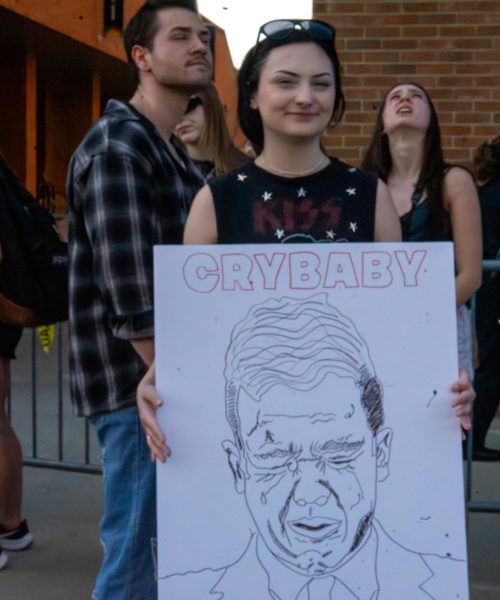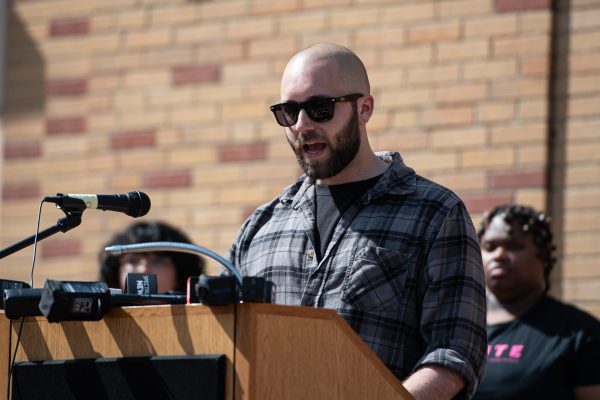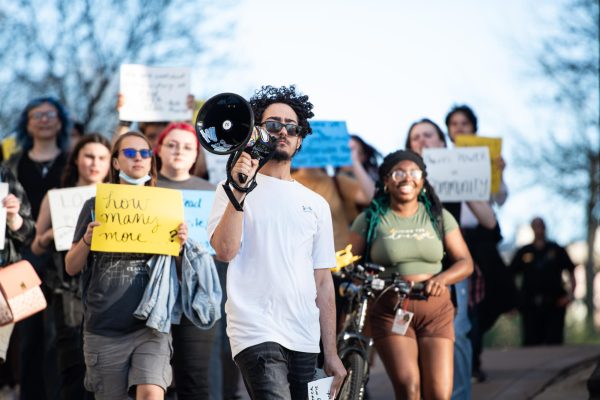The other side of learning
January 20, 2009
Undergrad research benefits studentsand professors in non-traditional ways
Senior physics major Richelle Teeling vividly remembers what her first experience with undergraduate research was like. She was working at the Liquid Crystal Institute with Antal Jakli, associate professor of chemical physics, about two summers ago. She was focusing on how to physically set up equipment for an experiment.
“I went to the lab and they gave me the equipment they wanted me to use and said ‘Figure out how to make it work,'” she recalled. “A lot of problems can happen, but in the end it helps you gain experience in real world problems, like if you were the professor with the lab.”
Teeling’s experience encompasses what many students engaging in undergraduate research go through. The trials and tribulations involved with researching complex topics, often with sophisticated equipment, yield one-of-a-kind experiences and a chance to expand knowledge in unconventional ways.
“It’s really a chance to learn things you won’t learn in the classroom,” Teeling said.
John West, vice president for research, said undergraduate research is important because of how it engages students.
“It allows students to expand the frontiers of knowledge,” said West. “When doing their research, students become involved in the discovery process itself.”
Gary Padak, dean of undergraduate studies, summarized how undergraduate research impacts students and the university as a whole.
“It’s important to the university because we promote excellence in action; so we also promote excellence in research,” said Padak. “We want to preserve knowledge and create new knowledge, and this can be a great way to feed students’ passion to learn.”
Padak said undergraduate research benefits both students and faculty on a variety of levels throughout the entire research process. The student and professor gain knowledge from their experiences that can have a positive affect on their personal, professional and academic lives.
Learning about yourself, too
Senior physics major Brian Dailey recently interned with a professor at the LCI as a programmer. Dailey is a theorist, which means it’s his job to find out “how things work together.”
“She really got me to look critically at a problem,” Dailey said of the professor. “When you’re doing the research and you get the answer and you can finally say ‘I got it!,’ it’s very satisfying.”
Aside from the thrill of reaching the goal of a project, one of the lasting effects of engaging in undergraduate research is having the opportunity to learn if this is what the student wants to do for their future career.
“Doing research shows you what you don’t want to do and what you do want to do,” said Teeling.
Teeling, who is working with faculty at the LCI to study the flexo electric effect (the idea that the flexing and bending of liquid crystal particles can produce electricity), believes that in conducting her research, she knows better what she wants to work on in the future.
“I’ve spent a lot of time in the lab. When I go to grad school, I’d like to be in the daylight,” she said with a chuckle.
Dailey agrees that the chance to learn more about what interests a student is very important. He said he really enjoys theoretical physics but wishes to explore other options related to his field.
Kent State faculty also have much to gain by mentoring and collaborating with undergrads. Professors can often supplement their own research with undergraduate projects based on other topics that interest them.
Joseph Ortiz, professor and graduate coordinator for the geology department, plays an important role in undergraduate research through his efforts to secure funding necessary to conduct experiments and expeditions.
Ortiz, whose concentration is in climatology, history and reconstruction of ocean patterns, has conducted experiments with undergrads who have studied the water quality of Lake Erie and the sedimentology of rock caves in Northeast Ohio.
Victoria Bocchicchio, curriculum coordinator for the Honors College, enjoys guiding students through their senior thesis, which is mandatory to graduate with honors. She said undergraduate research is more engaging than traditional teaching and it gives students an opportunity to take ownership of what they’re learning.
“When beginning your research early, you can find out what interests you. There’s personal satisfaction you get from studying something you’re curious about,” said Bocchicchio. “The personal growth is something you can’t get anywhere else.”
‘It can be a little nerve wracking’
Lisa Kurz, senior international relations major, who recently defended her senior honors thesis on neoliberalism in Latin America, began researching her topic last fall. Kurz has conducted honors studies before, but she got involved this time with hopes of improving her writing skills before graduate school.
“It’s definitely a good experience, but it is a lot of work,” Kurz said. “It’s interesting, but it can be a little nerve-wracking. You learn how to manage your time and communicate your ideas, which can be difficult for some people.”
Teeling said her work can become a little tedious, but she stressed the importance of talking with professors when feeling pressure.
At this point, the faculty has a chance to learn how to better work with the undergrads who are less experienced in the field.
After working on projects with several graduate and undergraduate students over the years, LCI graduate student John Harden thinks that undergraduate research provides him and the students with a different perspective of the educational process.
“Working with undergrads has been a good experience for me,” he said. “You learn to work with people with less experience and how to help train future scientists. It’s good for them to see what the non-classroom side of science is all about.”
Students also understand that their professors are always there for support.
“In the academic world, we’re still babies,” Teeling explained. “Our professors know that, and most people are happy to help you.”
“It’s true,” Dailey agreed, “When you feel daunted, talk to other people. They’ll make you feel better.”
A way of preparing for the real world
“The research enhances their education,” said Ortiz. “It’s good to start early (as an undergrad) because students reach their intellectual maturity at different ages. We start out as consumers of knowledge; then we create our own knowledge. It all takes preparation.”
Experience in undergraduate research not only enhances a student’s education, but it also allows students to sample a taste of what their professional lives may be in the real world.
LCI director Oleg Lavrentovich encourages future scientists to get involved as early as possible.
“A profession in the sciences is not an easy one,” Lavrentovich said. “This is the best time to gain a passion for your work. And it really gives students a taste of what it’s like to be a scientist.”
Kurz said one of the most rewarding experiences about conducting research is realizing what she can accomplish on her own. She values knowing she could succeed in situations that reflect the reality of her profession.
“The most important part is being able to do all that research on my own,” she said, “and being able to go ahead and finding that research and knowing that you have the confidence to relay that information well and properly.”
Padak says overall this kind of unique, in-depth research can help students appreciate a broader perspective of the academic world.
“They conduct their research because it’s new and fascinating,” said Padak. “The research is episodic and idiosyncratic . it helps students train their minds.”
Contact sciences reporter Jeremy Nobile at [email protected].























